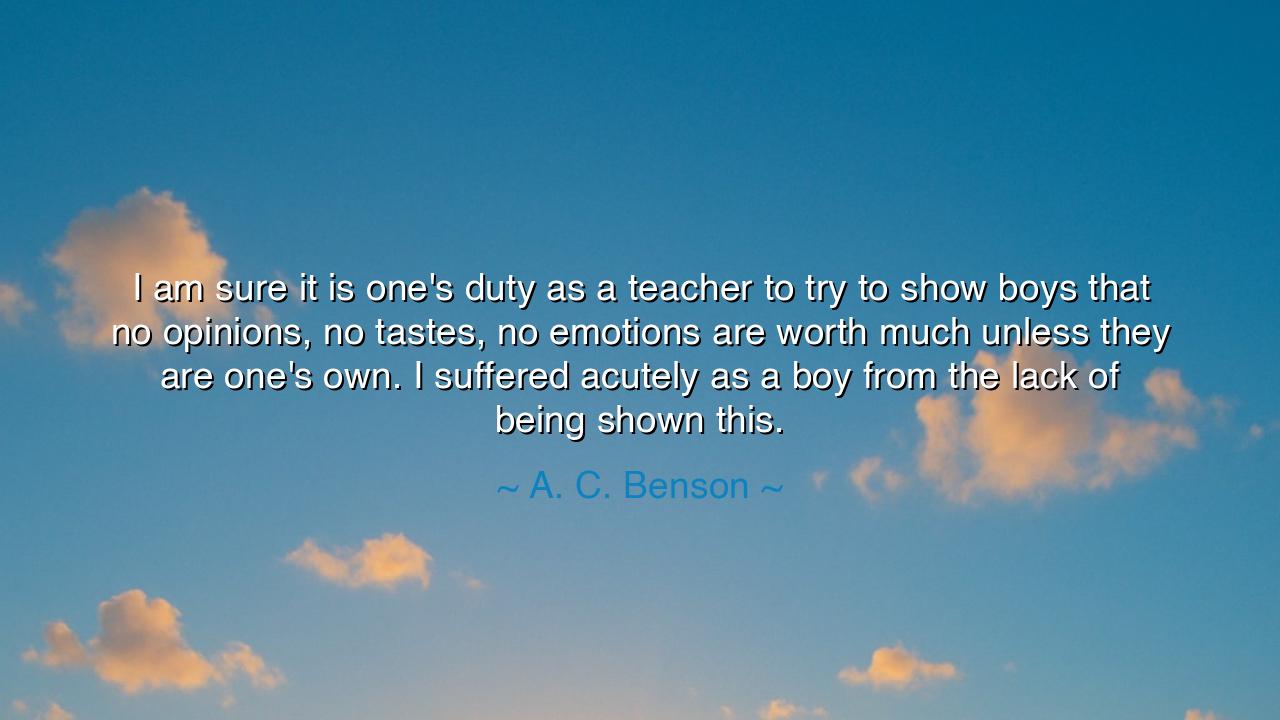
I am sure it is one's duty as a teacher to try to show boys that
I am sure it is one's duty as a teacher to try to show boys that no opinions, no tastes, no emotions are worth much unless they are one's own. I suffered acutely as a boy from the lack of being shown this.






A. C. Benson once wrote: “I am sure it is one’s duty as a teacher to try to show boys that no opinions, no tastes, no emotions are worth much unless they are one’s own. I suffered acutely as a boy from the lack of being shown this.” In these words lies both confession and command. He speaks of his own pain—how in youth he was burdened by borrowed thoughts, borrowed feelings, borrowed judgments—yet he also declares the sacred responsibility of the teacher: to lead the young not into imitation, but into authenticity. For what value is there in an emotion that is second-hand, in a taste copied from another, in an opinion merely repeated? The soul must find its own voice, or it remains forever silent, even while speaking.
The origin of this reflection lies in Benson’s own life as a writer and educator. Raised in a household of scholars and clergy, he was surrounded by expectations, traditions, and judgments. In such an environment, it is easy for a child to mistake conformity for truth. But in his maturity, Benson recognized what he had missed: a teacher who would have freed him from the tyranny of imitation, who would have taught him that to think, to feel, to choose for oneself is the only path to genuine life. From this wound he drew wisdom, urging others to give to the young what he himself had lacked.
The ancients knew this truth well. Socrates, in Athens, refused to simply hand down doctrines. Instead, he asked questions, pressing his students to think for themselves. He wanted them to discover, not to repeat; to own their thoughts, not to parrot his. Likewise, the Buddha told his disciples, “Do not believe something because I have said it. Test it for yourself; only then accept it.” Both voices echo Benson’s conviction: that opinions, tastes, and emotions must be born from within, else they are hollow and powerless.
History offers us striking examples. Consider the young Vincent van Gogh. As a boy, he tried to imitate the tastes of others, pursuing paths that did not fit him—religion, trade, convention. Yet only when he surrendered to his own vision, his own sense of color and form, did he become what he was meant to be. His art, once scorned, later changed the world. If he had remained trapped in borrowed opinions, his genius would never have found its expression. Here we see the truth of Benson’s warning and the power of authenticity.
The meaning of the quote is not to despise learning from others, but to remember that learning is a seed, not the fruit. A teacher can offer guidance, but each soul must grow into its own. To live entirely on borrowed judgments is to live a shadow-life. Only when the young are encouraged to examine, to feel deeply, to trust their inner voice, do they become whole. A borrowed emotion is no emotion at all; a borrowed opinion crumbles when tested; a borrowed taste leads only to emptiness. But what is truly one’s own endures, because it springs from the roots of the self.
The lesson for us is clear: as parents, as mentors, as guides, we must do more than pass on knowledge—we must awaken individuality. Teach the young to think, to question, to discern, to choose. Do not demand that they carry your tastes, but inspire them to discover their own. And if you are a student of life, do not cling too tightly to the words of others. Let them guide you, yes, but test them in the fire of your own heart until they become truly yours. Only then will they have power.
In practice, this means cultivating self-examination and courage. When you adopt an opinion, ask yourself: is this truly mine, or merely borrowed? When you follow a path, ask: does this reflect my deepest self, or the pressure of others? And if you guide others, do not burden them with your mold—give them the tools to shape their own. In this way, authenticity is born, and lives become not copies but originals, not echoes but voices.
Therefore, remember Benson’s words: “No opinions, no tastes, no emotions are worth much unless they are one’s own.” Let them guide you toward freedom of spirit. For the greatest gift a teacher can give is not the weight of their own judgments, but the strength for a student to form their own. And the greatest gift a soul can give itself is to live truly, authentically, in harmony with the inner voice that was placed within it by the Creator.






AAdministratorAdministrator
Welcome, honored guests. Please leave a comment, we will respond soon